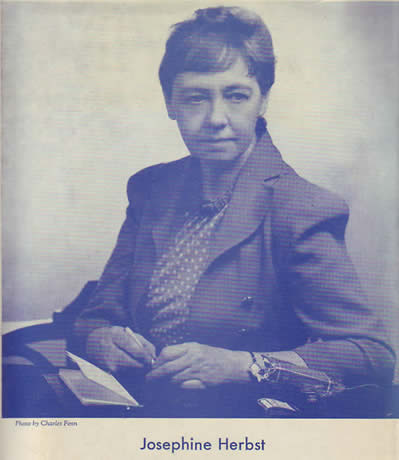Collection Guide
This document describes a Manuscript Collection held by the
Special
Collections Department
University of Iowa
Libraries
e-mail: lib-spec@uiowa.edu

Guide Contents
Biographical and Historical Information
Scope and Contents of the Collection
Administrative Information
Access and
Restrictions:
Biographical Note
Josephine Frey Herbst, born in Sioux City, Iowa, in 1897, attended Morningside College, the University of Iowa, the University of Washington, and was graduated from the University of California in 1918. In 1920 she worked at a variety of jobs in New York -- everything from a department store employee to a charity organization case-worker to a publicity writer and editorial reader for H. L. Mencken. Her interest in writing stems from childhood and her first story was published in The Smart Set in 1923. In 1925 she married a writer, John Herrman. Throughout her life she was constantly engaged in observing and writing about areas of trouble and unrest, both in this country and abroad. She lived in Germany from 1922 until 1925 and returned to Europe in 1930, visiting Austria and the Soviet Union; in 1932 she was in Mexico, in Iowa during the farm strike, and in 1934 in the Midwest farming region again in the time of the drought. 1935 found her in Cuba during the General Strike and that same year in Germany to do a series of newspaper articles for the New York Post. She was in Flint, Michigan, at the time of the General Motors sit-down strike in 1937, then in Spain as a correspondent during the bombardment of Madrid. In 1939 she traveled to South America. During these years Josephine Herbst was concerned with the breakdown of capitalist society and the shift towards collectivism; she felt that the future would be closely bound up with the future of the farmer and the worker, and she must keep in touch with their world. She is known as the writer of the proletarian novel. Her trilogy, Pity is Not Enough, The Executioner Waits, and Rope of Gold has been called a "subtle blend of art and propaganda." In 1936 Josephine Herbst received a Guggenheim fellowship in the field of the novel. |
Josephine Herbst died on January 28, in 1969, at the age of seventy-seven, and is buried in a family plot in Sioux City.
Scope and
Contents
Audio Visual Materials: Audio cassette tape, Box 1
Photographs:
Related Materials
Bevilaqua, Wninfred Farrant. An Introduction to Josephine Herbst, Novelist
The Bieneke Library at Yale University has a collection of Herbst's papers.
Acquisition and Processing Information
These papers
were given to the University of Iowa Libraries by
Guide posted
to Internet:
Audio cassette tape. Elman, Richard. Review of biography of Josephine Herbst. NPR's "All Things Considered," August 19, 1984.
Book Jackets
Nothing is Sacred – negative image
Pity is Not Enough – negative image
Clippings, 1931 -- 1997
Correspondence
To Mr. Milkman
December 10, 1928
To Cap
January 18, 1939
February 12, 1939
March 9, 1939
March 10, 1939 ?
May 15, 1939
June 6, 1939
To Mr. Roberts
March 15, 1945
Herbst, Josephine. “The Farmer Looks Ahead.” The American Mercury, issue date unknown
Loose pages from The German Language
Magazine and Journal Articles
Bevilacqua, Winifred Farrant. “An Introduction to Josephine Herbst, Novelist.” Books at Iowa. University of Iowa, 1976.
Interview with Elinor Langer, biographer. Publisher’s Weekly, 1984.
Langer, Elinor. “Love Among the Literati.” Ms., 1984.
Langer, Elinor. “If in Fact I Have Found a Heroine…” Mother Jones, 1981.
Manuscripts
Somewhere the Tempest Fell. Printer's typescript with revisions. 3 folders
Miscellaneous
Photograph, Josephine Herbst, undated
Sioux City Public Library Event Materials